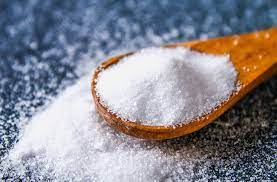Nigeria imports N155b salt, local manufacturers handicapped by high costs
By Jeph Ajobaju, Chief Copy Editor
Salt importation has cost the treasury N155 billion in the past two years, as local manufacturers are handicapped by high production costs, with huge deposits of the mineral left untapped in nine states North and South, chief of which is Ebonyi.
Abuja under Muhammadu Buhari allocated N198 billion in the same period for the development of natural resources, including salt.
Regardless, Foreign Trade Statistics report by the National Bureau of Statistics (NBS) shows N155 billion was spent to import salt, palm oil, and coals.
Another report by the Federation Account Allocation Committee (FAAC) said N198 billion was earmarked for developing natural resources across the country.
But NBA Foreign Trade Statistics report shows Nigeria imported palm oil, mainly from China and Indonesia, and crude salt from Brazil.
Salt is one of the most common mineral resources in Nigeria, found in large deposits in Ebonyi, whose slogan is “the salt of the nation”.
Other states with salt deposits include Abia, Akwa Ibom, Benue, Cross River, Anambra, Imo, Katsina, and Sokoto.
The PUNCH reports that there are fewer than five salt manufacturers in Nigeria as the sector is squeezed by high production costs, foreign exchange (forex) scarcity, and energy crisis.
_______________________________________________________________
Related articles:
Dangote Sugar Refinery to employ 30K youths, cut import 40%
Nigeria budgets N875b for agric, imports N8tr food
Nigeria suffers N3.5tr post harvest food loss yearly
_________________________________________________________________
Ebonyi salt development abandoned
Salt development in Ebonyi has been abandoned despite previous funds from the Japanese government, according to The PUNCH.
Despite huge salt deposits in nine states and the billions committed to developing natural resources, Nigeria spends billions of naira on importation of salt.
Also, more than N100 billion has been spent on importation of palm oil from Asia in the past two years.
In past decades, before the discovery of crude oil, Nigeria’s palm oil accounted for about 43 per cent of the world’s production, and it was the biggest player in the global market.
The production of palm oil was more than sufficient for local consumption; with the excess exported for forex earnings.














